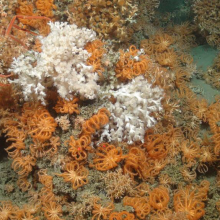Source: National Oceanography Centre
NOC scientists contributed to a recent review of studies of submarine canyons, which identified they are at risk from human activities, and require better protection.
The review was published in the journal Frontiers in Marine Science by a team of scientists that are part of the International Network for submarine Canyon Investigation and Scientific Exchange (INCISE), co-ordinated by Dr Veerle Huvenne from the NOC and Dr Jaime Davies from Plymouth University. INCISE is an initiative that aims to bring together scientists working on all aspects of submarine canyon research, and to stimulate discussions across disciplines.

NOC scientist Dr Veerle Huvenne, and co-author of the review, said, “Submarine canyons are some of the most important environments along our continental margins, which can host very rich ecosystems and can support rich fisheries. However, as a result of their steep terrain and their complex oceanography, they have always been very difficult to investigate.
Thanks to rapid technological developments, especially in marine robotics, we can now study these environments in much more detail. The CODEMAP project, funded by the European Research Council, makes use of such technologies, available at the National Oceanography Centre.”
Submarine canyons are major geomorphic features on continental margins, which face a number of current and future issues for their conservation. Pressures from human activities include litter, fishing, dumping of land-based mine tailings, oil and gas extraction and climate change. The review proposes the types of research required to inform management measures to protect canyon ecosystems.
Continue reading: http://noc.ac.uk/news/important-submarine-canyons-ecosystems-are-risk

